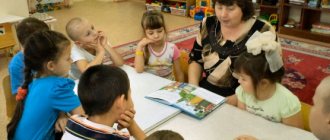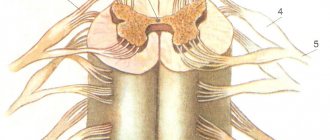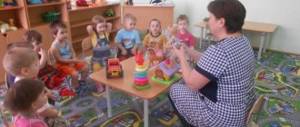Lexical means: tropes
Allegory - Themis (woman with scales) - justice. Replacement of an abstract concept with a concrete image.Hyperbola — Bloomers as wide as the Black Sea (N. Gogol) Artistic exaggeration.Irony - Where are you getting your head from, smart one? (Fable by I. Krylov). Subtle mockery, used in the opposite sense to the direct one. Lexical repetition - Lakes all around, deep lakes. Repetition of the same word or phrase in the textLitota - A small man. An artistic understatement of the described object or phenomenon.Metaphor — Sleepy lake of the city (A. Blok) Figurative meaning of the word based on similarityMetonymy — The class was noisyReplacing one word with another based on the contiguity of two conceptsOccasionalisms - The fruits of education. Artistic means formed by the author.Personification - It is raining. Nature rejoices. Endowing inanimate objects with the properties of living things. Periphrase — Leo = king of beasts. Substitution of a word with an expression similar in lexical meaning.Sarcasm — The works of Saltykov-Shchedrin are full of sarcasm. Caustic, subtle mockery, the highest form of irony.Comparison -When a nightingale speaks a word, it sings. In comparison, there is both that which is compared and that with which it is compared. Conjunctions are often used: as, as if, as if. Synecdoche - Every a penny brings (money) into the house. Transfer of value based on quantitative characteristics.Epithet - “ruddy dawn”, “golden hands”, “silver voice”. A colorful, expressive definition that is based on a hidden comparison.Synonyms - 1) run - rush. 2) The noise (rustle) of leaves. 1) Words that are different in spelling, but close in meaning. 2) Contextual synonyms - words that are similar in meaning in the same context Antonyms - original - fake, callous - responsiveWords with opposite meaningsArchaism - eyes - eyes, cheeks - cheeksAn outdated word or figure of speechBrief information about each trail
- epithet - a figurative, colorful, expressive definition, which is based on a hidden comparison (lemon light);
- metaphor - a word or expression that is used in a figurative meaning based on the similarity of two objects or phenomena according to some characteristic (color, volume, shape, etc.) (the abyss of grief);
- personification is a type of metaphor based on the transfer of human properties to inanimate objects (the guitar sang);
- comparison - a comparison of two objects, concepts or states that have a common attribute (words burn like flames);
- metonymy - the transfer of properties of one object to another based on the contiguity of two concepts (read Pushkin);
- synecdoche - techniques based on the transfer of meaning according to a quantitative characteristic or on the transfer of the name of a whole by the name of its part and vice versa (And it was heard until dawn how the Frenchman rejoiced);
- hyperbole - artistic exaggeration of the properties of objects (scared to death);
- grotesque - a bizarre mixture in the image of the real and the fantastic, the beautiful and the ugly, the tragic and the comic (a nose walks along the avenue);
- litotes – belittling the properties of an object (a little boy);
- periphrasis - a phrase that is used instead of any word or phrase (king of beasts);
- allegory - allegories (walked like a bear);
- irony - subtle ridicule, the use of a word in the opposite sense (“Break off, smart one, are you delusional, head?”);
- allusion - a hint at a certain fact or circumstance that is often not understood by many (“Such a fatherland is such smoke really so pleasant” V.V. Mayakovsky - a reference to “Woe from Wit” by A.S. Griboyedov);
- reminiscence - reproduction in the text of a familiar construction or phrase from another work (“I loved you. Love still (perhaps just pain) drills into my brain.” In the poem, I. A. Brodsky refers the reader to the poem by A. S. Pushkin).
Syntactic means
Anaphora - The thunderstorm was not in vain. Repetition of words or combinations of words at the beginning of sentences or poetic lines.Antithesis - Long hair - short mind;.Contrast.Gradation - I came, I saw, I conquered! Arrangement of words and expressions in increasing (ascending) or decreasing (descending) significance.Inversion - Once upon a time there lived a grandfather and a woman. Reverse word order.Compositional junction (lexical repetition) - It was a wonderful sound. It was the best voice I've heard in years. Repeating at the beginning of a new sentence words from the previous sentence, usually ending it. Multi-union - The ocean walked before my eyes, and swayed, and thundered, and sparkled, and faded away. Deliberate use of a repeating conjunction.Oxymoron - Dead souls. A combination of words that cannot be combined in meaning.Parcellation - He saw me and froze. I was surprised. Silenced. Deliberate division of a sentence into semantically significant segments. Rhetorical question, exclamation, appeal - What a summer, what a summer! Who hasn’t cursed the stationmasters, who hasn’t sworn at them? Citizens, let's make our city green and cozy! Expressing a statement in interrogative form; to attract attention; increased emotional impact. Series, pairwise combination of homogeneous members - Nature helps to fight loneliness, overcome despair, powerlessness, forget hostility, envy, and the deceit of friends. The use of homogeneous members for greater artistic expressiveness of the textSyntactic parallelism - To be able to speak is an art. Listening is a culture. (D. Likhachev) Similar, parallel construction of phrases and lines. Default - But listen: if I owe you... I own a dagger, / I was born near the Caucasus. The author deliberately understates something, interrupts the hero’s thoughts so that the reader can think for himself what he wanted to say.Ellipsis - Guys - for the axes! (the word “taken” is missing) Omission of some member of the sentence that is easily restored from the context Epiphora - I've been coming to you all my life. I believed in you all my life. Same ending for several sentences.Vocabulary
Tropes are a figure of speech in which a word or expression is used in a figurative sense. Paths are based on internal rapprochement, comparison of two phenomena, one of which explains the other.
Metaphor is a hidden comparison of one object or phenomenon with another based on similarity of characteristics.
(p) “The horse is galloping, there is a lot of space,
The snow is falling and the shawl is laying down"
Comparison is a comparison of one object with another based on the principle of their similarity.
(p) “Anchar, like a formidable sentry,
Stands alone in the entire Universe"
Personification is a type of metaphor, the transfer of human qualities to inanimate objects, phenomena, animals, endowing them with thoughts with speech.
(p) “The sleepy birch trees smiled,
Silk braids disheveled"
Hyperbole is an exaggeration.
(p) “A yawn tears wider than the Gulf of Mexico”
Metonymy is the replacement of the direct name of an object or phenomenon with another that has a causal connection with the first.
(p) “Farewell, unwashed Russia,
Country of slaves, country of masters..."
Periphrasis - similar to metonymy, often used as a characteristic.
(p) “Kisa, we will still see the sky in diamonds” (we will get rich)
Irony is one of the ways of expressing the author’s position, the author’s skeptical, mocking attitude towards what is depicted.
Allegory is the embodiment of an abstract concept, phenomenon or idea in a concrete image.
(p) In Krylov’s fable “Dragonfly” is an allegory of frivolity.
Litota is an understatement.
(p) “... in big mittens, and he’s as small as a fingernail!”
Sarcasm is a type of comedy, a way of demonstrating the author’s position in a work, a caustic mockery.
(p) “I thank you for everything:
For the secret torment of passions... the poison of kisses...
For everything I was deceived by"
Grotesque is a combination of contrasting, fantastic and real. Widely used for satirical purposes.
(p) In Bulgakov’s novel “The Master and Margarita,” the author used the grotesque, where the funny is inseparable from the terrible, in a performance staged by Woland in a variety show.
An epithet is a figurative definition that emotionally characterizes an object or phenomenon.
(p) “The Rhine lay before us all silver...”
An oxymoron is a stylistic figure, a combination of words that are opposite in meaning, contrasting, creating an unexpected image.
(p) “heat of cold numbers”, “sweet poison”, “Living corpse”, “Dead souls”.
— uchim.org
Phonetic means: sound recording
Alliteration - Completehsometimes in the swamp depthswAnd/ Hwow wordswbut, damnwsmart wurshat kamawand - a combination of hissing consonants helps to convey the rustling of the reeds. The repetition of consonants creates an image.Assonance - LYublYu birch treesat Ratsskwow It's brightwow, then gratstnwow – conveys slight sadness and tenderness. Repetition of vowels, creating an image.Gradation - I came, I saw, I conquered! The arrangement of words and expressions is in ascending order (inSolve task 26 of the Unified State Exam in the Russian language with answers.
Means of artistic expression (table)
Means of artistic expression are divided into lexical and syntactic.
Lexical means of expression
This is the lexical meaning of words and expressions. The lexical meaning of a word is the meaning, concept, meaning of a phenomenon/object.
For example, tropes (words are used figuratively).
| Figure of speech | Meaning | Example |
| Allegory | Depicting an abstract idea through a concrete image |
|
| Hyperbola | Obvious exaggeration or embellishment of reality |
|
| Irony | The opposite of what a person really thinks is conveyed, this is ridicule | Here, however, was the color of the capital, And know, and fashion samples, Faces you meet everywhere Necessary fools; (A.S. Pushkin) |
| Lexical repetition | Repeating words or entire phrases | Joints languish without medicine, Complications threaten the joints... (advertising "Chondroxid") |
| Litotes | Great understatement |
|
| Metaphor | Two terms are compared in an unusual sense |
|
| Metonymy | Replacing one term with another, if there is a logical connection between them |
|
| Personification | Animation of inanimate objects |
|
| Periphrase | Allegory; the name changes to some characteristics | using "blue planet" instead of "Earth" |
| Sarcasm | Unkind irony, caustic expression with humor | Nice perfume. How long did you marinate in it? |
| Synecdoche | Some small, specific concept is replaced by a more generalized one or vice versa |
|
| Comparison | A comparison of two concepts; conjunctions are often present: as, as if, etc. | eyes as yellow as amber |
| Epithet | An adjective, adverb, participle, or verb is used to describe something |
|
Syntactic means of expression
These are figures of speech, the way the author creates phrases, thereby placing emphasis and emotionally influencing the reader.
| Figure of speech | Meaning | Example |
| Anaphora (unity of principle) | Repetition at the beginning of lines, sentences, etc. | The city is lush, the city is poor... (A.S. Pushkin) |
| Antithesis | Contrasting words or concepts | Learning is light and ignorance is darkness |
| Gradation | Gradual reproduction of events or feelings along an increasing (or decreasing) trajectory | I came, I saw, I conquered |
| Nominative themes | Separating a noun in the nominative case |
|
| Polyunion (polysyndeton) | Homogeneous members are united by deliberate repetition of unions | There was typhus, and ice, and hunger, and a blockade (G. Shengeli) |
| Oxymoron | Paradox, putting words with opposite meanings together |
|
| Parcellation | Dividing a sentence into separate phrases or words to add special emphasis | The young artist <...> fell ill. And within a few days I lost my hearing. Forever. Almost completely (I. Andronikov) |
| Rhetorical question, exclamation, appeal | Used to intensify expressiveness |
|
| Syntactic parallelism | Repetition of the structure of a sentence or its individual parts (within a sentence) | I am a king, I am a slave, I am a worm, I am a god (G. R. Derzhavin) |
| Default | The author interrupts the hero’s words so that the reader himself understands what he wanted to say | But listen: if I have to To you... I own the dagger, I was born near the Caucasus (A.S. Pushkin) |
| Ellipsis | Exclusion of one of the members of the proposal | Tatiana in the forest; the bear is behind her; The snow is loose up to her knees; (A.S. Pushkin) |
| Epiphora | Repeating the end of a sentence (word or phrase) | The guests came ashore Tsar Saltan invites them to visit... (A.S. Pushkin) |
Means of graphic expression
Artists are already using their own techniques:
- texture (paper can be smooth or embossed);
- background (color and tone of the surface);
- line (figurative, calligraphic, geometric);
- stroke (short lines);
- rhythm (different sizes of objects and distances between them);
- spot (square, circle, etc.);
- chiaroscuro and tone (the relationship between light, shadows, textures, shapes, etc.).
Find out more about:
- Allegory;
- Lexical repetition;
- Metonymy;
- Metaphor;
- Sarcasm;
- Irony;
- Hyperbole;
- Syntactic parallelism;
- Antithesis;
- Periphrase;
- Epithet;
- Anaphora;
- Oxymoron.



